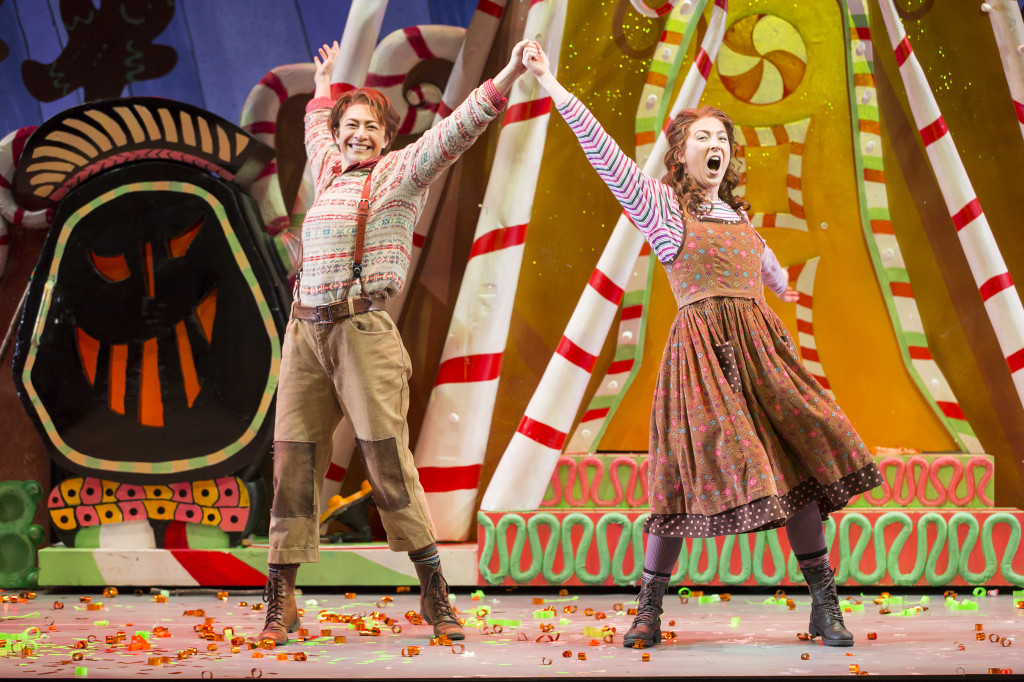 Every artistic company wishes it could come up with a seasonal title that could be come a holiday tradition — their own “Nutcracker,” “Messiah” or “Christmas Carol” to rely on every December.
Every artistic company wishes it could come up with a seasonal title that could be come a holiday tradition — their own “Nutcracker,” “Messiah” or “Christmas Carol” to rely on every December.
For the Washington National Opera, why not “Hansel and Gretel”? It has kids (or adults pretending to be kids) as lead characters, gingerbread houses and structural candy canes to boot.
There is that thing, though, about throwing children into ovens for dinner.
Things are pretty dark in the tales written down by the German brothers whose very names were Grimm. And whether it’s stepmothers plotting the deaths of their more beautiful daughters (“Snow White”), baby abduction (“Rumplestiltskin”) or wolves menacing little girls (“Little Red Riding Hood”) the fearsome tales handed down are thought to be essential ways for the young to process natural fears. Or so says Bettelheim.
The bigger problem with “Hansel and Gretel” is that it is an opera. And while it is presented as a family event and a perfect introduction to the young to the splendors of the musical form, it also has much of the barriers, such as the high sopranos whose lines, even in English, are not always clear, and some drawn out scenes rather than action.
The opening matinee audience seemed pretty caught up in the production, though, from the antics of Hansel and Gretel (and Julia Mitzner and Jennifer Cherest in that performance; they alternate with Aleksandra Romano and Ariana Wehr) to their interactions with their mother (Daryl Freedman) and eventually, the witch.
Kerriann Otano’s witch is styled to be less craggy and more robust a witch than we would expect, with grand horned curls atop her head and a prosthetic chin to match, she’s more of a Ursula type from “The Little Mermaid” (which is from Hans Christian Andersen, not the Grimms).
But still, she’s got that big oven alongside her fanciful gingerbread house, and a candy cane cage, a veritable metaphor for the season’s excesses.
Nineteenth century composer Englebert Humperdinck wrote the light opera with a libretto by his sister, Adelheid Wette, stitched from a handful of folk melodies, which not only fits its rural setting, but makes the work sparkle with melodies.
Conductor Michael Rossi keeps the music suitably sprightly and it is the live music — and the “musical zoo” that precedes the matinee that may be one of the most educational parts of the event for children.
The vocals, while solid, aren’t varied, however in a work packed with more sopranos than HBO.
It begins with having both Hansel and Gretel soprano and mezzo-sopranos. And though’s Mitzner’s actions define her as the more mischevous brother the sound of the siblings is strictly “Gretel and Gretel.” Like the traditional female lead in “Peter Pan,” it’s another thing to try to explain to confused kids on the way home.
As mother, mezzo-soprano Freedman is dominant in voice and action, though it’s hard to understand mothers in any era banishing their children to the woods for something as simple as upending the milk pitcher. The phrase “no use crying over spilt milk” was not widely known in 1894 (though some found its first use in 1888.
The family was hungry though, and one thing director Sarah Meyers communicates with the stark empty table that everyone stares at, is the reality of rural poverty and hunger — another lesson for the younger audience members dolled up in crinoline holiday attire.
No voice is more welcome in “Hansel and Gretel” than Russian-American baritone Aleksey Bogdanov, if only because its the only man’s voice in the production. But he goes better than that, richly expressive as the worker who recently scored a big basket of goods, rendering the banishment unnecessary.
Some of the best moments of wonder and theatrical magic are those Meyers seemingly added during the woodland wanderings, when an owl, turkey, wolf and boar, all beautifully costumed by Timm Burrow, come out to circle, menace and ultimately protect.
It’s no more an interruption to the original story than is the Dew Fairy (Melissa Mino) and Sandman (Raquel Gonzalez) of Humperdinck’s invention — both good excuses for more good costumes and plenty of glitter.
The witch seems to come relatively late to the action but is quite bold in her own costuming and certainly her action. And though it’s not developed much in the story, the appearance of a children’s choir from out of a batch of previously imprisoned gingerbread people is a surprisingly emotional moment. Maybe it’s just the variety of hearing natural children’s voices among all the adult sopranos.
it’s not clear that every child who attends “Hansel and Gretel” is ready for “La Traviata,” but it’s a nice change of pace among the usual holiday offerings on D.C. stages. Even if it will make kids think twice about future gingerbread consumption of the season.
“Hansel and Gretel” from the Washington National Opera runs through Dec. 20 at the Kennedy Center Terrace Theatre, 2700 F St. NW, Washington, D.C.